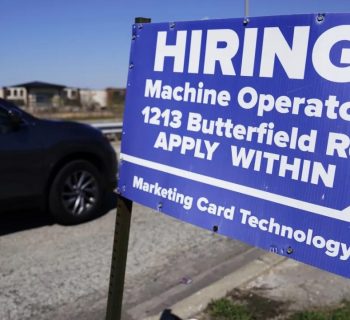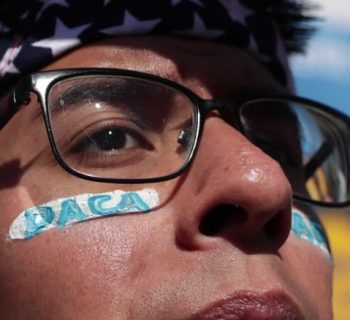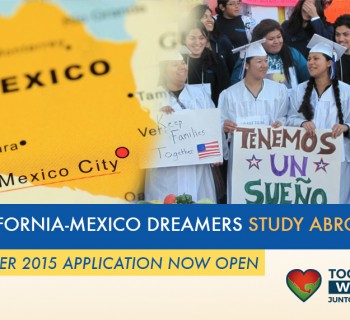By: GOPUSA ~ The Orange County Register~ January 16,2019
His mother was dying and he was desperate. So Dario Guerrero Meneses took her to Mexico for an experimental treatment.
Guerrero, a DACA recipient, had applied for permission to leave the U.S., but, eager to save his mother, didn’t wait for the answer.
That move cost the Long Beach resident, then a student at Harvard University, the immigration status that gave him temporary relief from the fear of deportation. The government figured he self-deported.
Guerrero was eventually allowed back into the country, following news reports and pressure from Harvard. Now, he and others are in Washington D.C. this week to bring attention to a little-known provision in U.S. immigration law that allows non-citizens to leave the U.S. and re-enter legally.
It’s called advance parole.
Until the fall of 2017, immigrants with the temporary status of Deferred Action for Childhood Arrivals, or DACA, could get permission to travel overseas. But over the past 20 months, the Trump administration has stopped accepting such requests.
Now, there is an effort to reinstate the advance parole provision for DACA holders, a push that some believe is starting to gain momentum even as critics say travel rights shouldn’t be offered.
Led by retired Cal State Long Beach Professor Armando Vazquez-Ramos and his non-profit California-Mexico Studies Center, a delegation of DACA recipients are in Washington D.C. this week to meet with legislators, hold a seminar and advocate their cause.
Some of those legislators already are on board. Last month, Congress members Alan Lowenthal, D-Long Beach, and Nanette Barragán, D-San Pedro, spearheaded a letter signed by 12 other legislators urging Secretary of Homeland Security Kirstjen Nielsen to restore the provision for people with DACA status to go freely abroad for humanitarian, educational and employment purposes.
“This is our best and last chance to bring attention to this problem on a national level,” said Vazquez-Ramos, who is financing much of the trip and is banking on fresh faces on Capitol Hill to be receptive to the young immigrants’ plight.
For people who were brought illegally to the U.S. as children, the trips are a way to reconnect with long-lost family. Sometimes, they’re anxious to return to visit a sick or dying relative, even if they see the U.S. as their home country.
“Fundamentally, their most important reason to go (abroad) is to reconnect with their families, their culture, their identity,” Vazquez-Ramos said. “This is a deep hole in their psyche.”
There’s also another benefit: leaving the country with a pre-approval for re-entry can help them later expedite an application for permanent legal status, usually through marriage to a U.S. citizen. The advance parole, or approval for re-entry, means they have entered the country legally and if they should ever apply for citizenship they can wait for their green card in the U.S. instead of being forced to leave while the documents are processed.
Through his center, based in his Long Beach home, Vazquez-Ramos has taken about 160 students with DACA to Mexico for language and cultural travel-study programs. About 25 percent of those students, he estimates, have gone on to obtain permanent resident status in the UnitedStates.
But critics of illegal immigration don’t want the resumption of advance parole for those with DACA, often for the same reasons some DACA supporters want it — claiming the right to travel and return is, essentially, a back door to permanent status.
“Congress created advance parole for a different situation. The law is clear on what types of endeavors are permitted; it’s supposedly for compelling reasons and for people who are in the process of getting their legal status and eligible for a green card,” said Jessica Vaughn, director of policy studies at the Center for Immigration Studies, which calls for restricting immigration to the United States. DACA recipients, she noted, are not eligible for a green card.
“The answer is not to return to this loophole. The answer is to come up with a program for people with DACA,” said Vaughn, who believes Congress should craft laws that create a pathway to citizenship for them.
From 2012, the first year of DACA, through Aug. 30, 2017, an estimated 43,000 DACA holders were approved for travel, a spokeswoman for the U.S. Citizenship and Immigration Services told the Southern California News Group last spring. Immigration officials this week could not provide any additional information.
For now, some 700,000 immigrants with DACA status have relief from deportation, and a work permit, for two years. Those protections are available to people with no serious criminal history who were brought into the United States as children. Trump has sought to abolish the program created by President Barack Obama, but courts have kept it alive. The U.S. Supreme Court is expected to announce soon whether it plans to weigh in. Meanwhile, lawmakers continue to bring up DACA as part of budget negotiations during the government shutdown, with some apparently using it as a bargaining chip, suggesting they might be willing to fund a bigger boarder wall if the Trump administration would back a path to citizenship for DACA recipients.
For DACA recipients and their families, the negotiations could be life changing.
Lidieth Arevalo, a Chapman University grad student from Long Beach who works with Vazquez-Ramos at his non-profit center, previously had tapped advanced parole seven times. But last year, when she applied to travel to Australia to produce films through a scholarship she’d then recently won, she was denied.
“It was very disappointing. I’ve done it before and saw the benefit of it. It really changed my life,” said Arevalo.
Some of her trips were with Vazquez-Ramos and other students. The initial trips were risky, they said, and people were nervous about whether they would really be allowed back in.
“They were willing to take the gamble,” said Vazquez-Ramos, who may have been the only educator in the nation specifically taking groups of DACA students abroad.
One student who traveled on his own, without a group, was Guerrero, the Harvard student who traveled to Mexico in hopes of a cure for his dying mother in 2014. He said it took two years after that trip to get his DACA status reinstated.
A film graduate, Guerrero — who came to the United States at age 2 — has made two films, one about his mother and what they went through and an earlier one about Harvard students who are in the country illegally. Through those films, he said he hopes to show viewers — strangers — that people who don’t have legal authority to live in the United States have similar challenges, hopes and dreams as legal residents.
“Ultimately, we want to just come back to the United States, where we’re rooted and where we contribute,” Guerrero said.
“If there’s an opportunity outside the U.S., it’s only temporary. And we want to take advantages of the opportunities and lessons, and bring them back, so we can contribute to our communities and the American system we live in,” Guerrero said.
“(And) if there’s a tragedy or an emergency, we don’t want to be apart from our families.”
It’s good to reconnect with one’s roots, he said. But, he added, when he went back to Mexico he felt like a stranger. It’s not home.
Source: GOPUSA ~ The Orange County Register~ January 16, 2019







